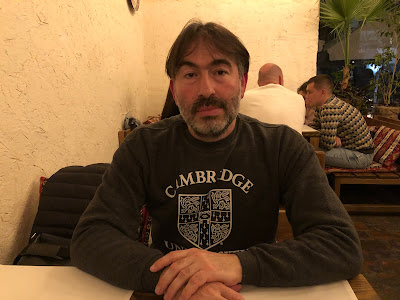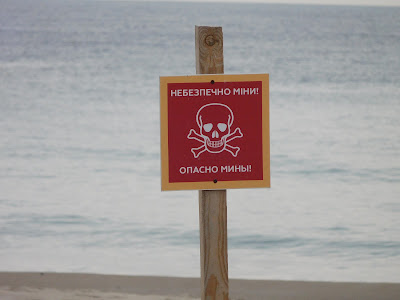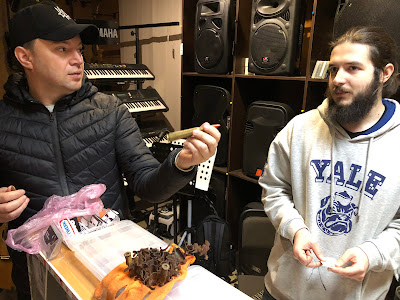Article and photos by Tony Mangia
On February 24, 2022, Vladimir Putin deployed ground forces and unleashed a barrage of missile attacks on an always apprehensive, but peaceful Ukraine. This unprovoked military assault changed the course of Ukrainian lives in an instant. Putin’s man-made storm of firepower and terror was enough to mobilize the Ukraine military and at the same time, generate a whole new faction of unheralded volunteers and grassroots activists into fighting a war from behind the scenes with little funding or resources. It was a movement born out of pride, as well as survival, in cities from Lviv to Kharkiv and wherever Ukrainian cries were heard.
 |
| A child's stuffed toy lies outside bombed apartment buildings in Zaporizhzhya. |
Spurred into action, many Ukrainians began sacrificing their incomes, time with their families and sometimes their lives in order to battle the indiscriminate and brutal Russian invasion and save fellow compatriots in need. Significant cogs in a supplemental machine addressing needs which the government and military sometimes can’t fill. Ukrainians who took it upon themselves to fight back in their own courageous ways.
This is an introduction to some of these unsung and resourceful Ukrainians you may never hear about — the activists, volunteers, fundraisers, suppliers, journalists, inventors, innovators, specialists and humanitarians who fight the war behind front lines and keep supply lines flowing and hope alive. I met these crusaders in Odesa and Zaporizhzhya — Ukraine cities besieged by the war — and would like to share some of their stories.
I had my first introduction to the reality of the war in Ukraine when I stepped off the bus from Moldova and the low-pitched groan of bomb sirens greeted me at the same time as my Ukrainian host, Vadym.
The wailing snapped me from the weariness of a 20-hour flight itinerary to Chisinau followed by a six-hour bus ride to Odesa. A highway route slowed down by three checkpoints (where soldiers took each passenger’s passport to a kiosk for verification). One while leaving Moldova and two entering Ukraine.
Vadym saw me glance up at the sky like I was expecting something to fall and shook my hand. He assured me we were in no danger in pretty good English.
“This is normal for us,” he smiled.
Looking around, it seemed like most Ukrainians felt the same way and went about their everyday business despite the ominous warning reverberating in the cool evening air.
Introduction to Ukraine
An immigration lawyer by trade, Vadym now finds himself teaching high school-aged students at at Odesa University during the war.
“Not too many people migrating to Ukraine right now,” he darkly joked before telling me about classes held in bomb shelters after sirens interrupted his lectures. He mostly does zoom classes now.
 |
| Vadym. |
We drove to the city center for dinner and a stroll. Curfew was 11 pm until 5 am in Odesa and many of the streets were already darkened because of area blackouts or voluntary shutoffs, although some businesses in the city center were still open. Pockets of mostly young adults congregated outside clubs and restaurants and I didn’t observe many children. The only McDonald’s was boarded up and shut down. Barricades of sand bags and hedgehogs (those vehicle deterrents that look like giant jacks from the child’s game) surrounded by soldiers blocking streets to government, military or other strategic areas were commonplace. The usually bustling waterfront was essentially shut off to the public at large—including the famous Potemkin Stairs.
The next morning Vadym led me to a bombed out beach hotel — a whole three-story section blown away to its cement slab — not far from his dacha (summer home) where I was staying. The resort inn sat underneath a probable target which the misfired drones had been aimed —a hilltop military base that was struck earlier in the war.
 |
| Half of Odesa resort hotel is all that's left after Russian drone strike. |
We then drove to a nearby apartment complex where Vadym showed me a section of a residential building — built upon a onetime Soviet-era military base closed decades ago — that was ripped apart by a drone strike. Two innocent civilians were killed in that attack — including a man just sitting in his car. Vadym said that Russia might have mistakenly targeted the building because its poor and dated intel still had it labeled as a military installation, but quickly added that he, and most Ukrainians, believe it was a deliberate attack on non-military citizens.
 |
| Russian bombs killed two innocent civilians at a residential apartment complex — decades ago it was a Soviet military base. |
We later walked the sidewalk along the Black Sea resort where signs warned bathers about drifting detached mines (strategically anchored in the water by the Ukrainian navy as a defense when Russia set its sights on Odesa— an important port city) floating dangerously close to the beaches. People still walked in the sand and a few foolhardily swam in the cold autumn water where, sadly, a few tourists were blown up by one of the deadly spiny orbs. Most people just frequented the kiosks selling hot dogs, coffee and flavored horilka (Ukrainian vodka) that were still open.
 |
| Sign warns beachgoers of deadly stray mines off Odesa shoreline. |
While checking out a group of motor scooters on the walk back to the car, Vadym tells me that the police have instructed motorcyclists to stop and shut off their engines when the sirens blare because they sound so much like the low-flying and noisier Iranian drones that Russia has been using to destroy Ukrainian cities. The similar buzzing could start confusion and panic. I would, over the next few days, notice that few of the bikers obeyed that rule.
 |
| Iranian drones launched by Russians sound like motorcycle engines. |
One day we went to a local organic market filled with local cheeses, meats, fish and produce. Vadym explained that most of the seafood was freshwater during the war because boats couldn’t fish the Black Sea with that maze of Ukrainian mines making navigation dangerous. He was a regular at the market and knew most of the vendors by name. I watched Vadym contently go from stand to stand purchasing all of the ingredients for a real homemade borscht he would prepare that night.
“Borscht is a true Ukrainian dish,” he proudly announced.
Vadym’s beet-based soup was a delicious nightcap with its dollop of sour cream and garlic, crusty bread and sea salt on the side — especially with the temperatures dropping.
 |
| "Borscht is a true Ukrainian dish" |
The next day, Vadym introduced me to a Crimean restaurant where we enjoyed yantyk (a sort of flattened giant pierogi) and local beers for lunch. It was Halloween and I saw a few spooky decorations and and a couple of costumed people through the restaurant’s window. There were no children trick or treating.
Sirens went on and off intermittently that night into the morning.
The next day, Kateryna, my contact in Zaporizhzhya, informed me via WhatsApp that there had been a major missile attack that morning and that she heard lots of explosions around Zaporizhhya.
We later found out the volley of explosive projectiles was the largest Russian bomb attack since October 10 and meant to disrupt the Monday morning commutes. The wide-ranging outage crippled electric grids and the internet all over central Ukraine.
Power resumed later on and it didn’t delay my 18-hour overnight train to Zaporizhzhya leaving that afternoon. The trains are capable of running on steam power if the electricity is out.
The Activist
I met Kateryna last spring in a Romanian train station while interviewing Ukrainian refugees making their way back to their homeland despite the war raging on. The strong will and determination I sensed during the fifteen minutes I spoke to her and her friend, Tania, before they hopped a bus out of Suceava across the border at Siret and back to Ukraine, intrigued me right away. I felt Kateryna had a lot more to say and I told her I would follow up on her journey back and their fight against Putin and his invasion.
To me, at the time, Kateryna seemed confounded, and a little suspicious, that a random American stranger at a train station would take such interest in the plight of Ukraine and its people. And, after we parted ways at that Romanian train station, I was sure Kateryna believed she would never hear from me again.
But I didn’t forget and Kateryna would become my central contact and enthusiastically introduce me to other guides when I did physically arrive in Ukraine five months later.
Five long months of teaching, networking and rallying Ukrainians during bombings, blackouts and personal sacrifices on her part. Five months of watching Ukraine hold their own from the sidelines through filtered news reports for me.
 |
| Activist and instructor Kateryna. |
When Kateryna met me at the Zaporizhzhya 1 train station, I’m sure she still had reservations about my aims and probably never thought I would follow up on my journalistic objective. The thought of an American actually showing up in Ukraine during a war after only a quick encounter and a few months of correspondence on Facebook was, to say the least, out of the ordinary.
Over the months, that spark of emotion I saw in her green eyes last May had now transformed into a altruistic crusade against Putin and Russian oppression since then. A glow that has turned into a fire.
A lawyer by trade, Kateryna had tired of the legal red tape and haggling and became an anti-Russia activist, fundraiser and consultant. She was born and raised in Zaporizhhya and her pride for her hometown was evident right away. So much, that Kateryna even insisted, after I suggested paying for a taxi to my hotel, on taking one of the new trollies she wanted to show off.
The Teatralny Hotel was a stately hotel —one of the nicest in Zaporizhhya — and more than I expected. It’s marble staircase in the lobby was barely tread theses days. The only time I knew of any other guests was when the late night bomb sirens sounded and from my room, I could hear hallway chatter and people clomping down the stairs to the basement. I, myself, would get used to the nighttime wails and just roll over back to sleep. It was the price of paying the war-bargain rate of twenty-five dollars US a night — and feeling guilty about it.
Kateryna seemed to know a lot of people as we walked through the city center. She showed me the charred fronts of residential buildings — their windows blown out and pulled back walls revealing the inside of people’s homes — results of the Russian bomb barrage on September 29 — only blocks from the hotel. Workers were still cleaning up the site.
 |
| Bombed buildings in city center of Zaporizhzhya. |
As we walked the old world streets, a convoy of four ambulances streamed towards the local military hospital, their distinctive European sirens breaking the serene quiet.
“If there is more than one ambulance,” bemoaned Kateryna, “It means they are probably carrying wounded soldiers.”
We were only about 15 miles from the front lines.
Diverting from the sobering reminders of war, I took Kateryna for lunch at a fashionable place she chose. It continually amazed me how life went on in Ukraine with the battlegrounds only miles away and the bombings routinely breaking up the conventionality of people's routines — not to mention the unbelievably low prices despite food supply shortages.
After the server placed a small folding chair next to the table for Kateryna’s handbag (I have never seen this before, but it is quite popular in most Zaporizhhya dining spots) we started with salads. I had dumplings along with a local beer. Over shots of a orange-colored berry tea made from sea-buckthorn tincture (native to Ukraine), I listened intently as Kateryna told me about her career as a “human systems architect, business strategist and advocate.”
She is involved in a number of NGOs, government organizations and consulting groups and it’s hard to list them all. Kateryna is also writing a book about human system architecture — a new science discipline which examines how human systems work by the same three rules of categorized restrictions: The rules of the human brain, the system rules and restrictions of the exact system.
Heavy stuff.
Kateryna was the inspiration for my trip and now a common thread to all of the brave people I will meet during my ten days in Ukraine. I know she won’t stop training civil activists until Ukraine is victorious.
After lunch, she introduced me to Sergio.
The Supplier
I meet Sergio at the top of some storefront basement stairs, standing next to banana cartons now filled with food goods and clothing. He and another man are toting the boxes downstairs. Sergio, the director for the Agency of Development of Chernigivske Territory, has been working tireless with his group of volunteers in Zaporizhzhya supplying coats and most importantly (right now) blankets for IDPs (Internally Displaced Persons) who will need warm clothing during the upcoming winter. Sergio stresses the need for simple amenities like blankets of any type.
 |
| Sergio and some new children's coats his volunteers made. |
Surveying the room, I spot an an area where a few camouflaged vests and medical kits sit in a corner of the cramped basement. Sergio proudly says he has volunteers making these personal armor vests and backpacks for the front-line soldiers too.
Sergio humbly tells me he has been heading the group since the war started and has been receiving donated supplies from the United States and other countries. Standing proudly in front of piles of new blue and red children’s hooded down coats, boxes of boots and shelves of baby food, Sergio says his group has supplied winter attire for over 1500 IDPs, including 200 Ukrainian children, but are still a long way from completing their task.
“Every blanket helps,” he reminds me before I say goodbye.
Kateryna makes a phone call and excitedly says, “He’s in his store.”
And off we go to meet Max.
The Innovator
A music store isn’t exactly where you would think of finding the visualization and funding of wartime supplies, but, if anything, The Rock Shop might be a good front.
Kateryna introduces me to the owner of the store, Max, and two of his employees, Dima and Ivan. The three of them are packing chocolates and individually wrapped cookies decorated with frosted flowers — in the blue and yellow of the Ukraine flag — that will be sent to soldiers on the front lines. They offer me one of the oversized cookies, which I sheepishly accept on the premise that I will eat the now symbolic confection “when Ukraine wins the war.” Making the honor twice as sweet.
That’s gets a laugh and thumbs up from everyone.
As I looks around the store, I mention the wide selection of ukuleles among the other musical instruments, speakers and keyboards.
“A lot of soldiers come in here,” says Dima in his Yale hoody. “They sit in corner and strum a ukulele or guitar to themselves.”
“It adds a touch of normalcy after weeks on the front lines,” adds Max.
Sending sweets and keeping up spirits within the troops are not Max’s only contribution to the war effort. On the side, he has been helping develop, test and fund —with his own money — the technology for a drone-like surveillance camera which can fly up to an altitude of two miles and travel a distance over 30 miles. Reconnaissance high technology that will be difficult for Russian tracking systems to locate and destroy. A real advantage for the Ukraine army.
Max tells me the trial runs have been good and prototypes almost ready for production.
Before I bid farewell to The Rock Shop, Dima and Max show me some large caliber ammo and a twisted and rusted belt with a few rounds still stuck in their sleeves that I saw laying on the counter.
 |
| Max and Dima show off some artillery from a blown up Russian tank a Ukrainian soldier brought in. |
“One of our soldiers brought this in as a thank you,” beams Dima. “It’s part of the machine-gun belt from a Russian tank his unit blew up.”
I could tell by Max and Dimas' grins that this was a thank you that meant a lot to these guys.
The Media
It was a sunny morning when Nataliia picked me up at the hotel, almost balmy compared to the usually chilly days of November in Zaporizhzhya. Our meeting was set up by Kateryna.
Nataliia is a media producer at a Zaporizhhya public access television station. Besides putting together interview programs and remote news coverage, Natalia produces radio and digital programming inside a state-of-the-art facility outside the city center. Stylishly dressed in a sweater with a fake fur vest, Nataliia suggests a quick lesson about Ukraine’s history would be a good way to start the day. I agree.
More —
